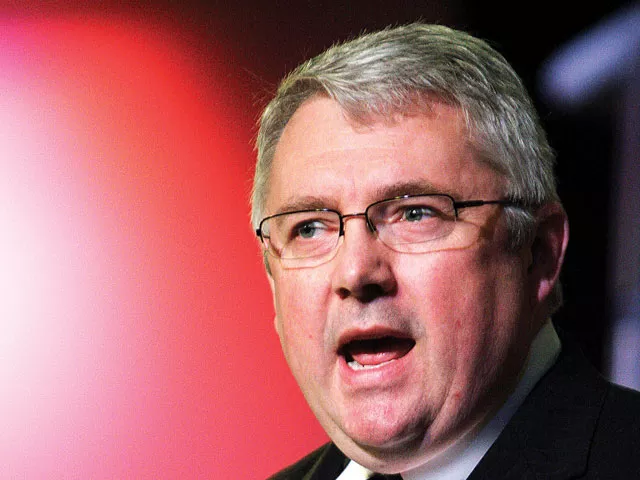It’s the first day of spring in Spokane Valley. The bright sun is slowly cooking away the chilly night air, and birds are beginning to sing again. But you wouldn’t know any of this from inside the New Life Church, an old Rosauers-turned-megachurch, where more than 300 Republican operatives have gathered for the Spokane County Republican Party Convention.
The auditorium’s lights are dimmed, speeches made and just about everybody seems to be having a great time discussing the Constitution, law and order, taxes and America. For a party faithful who should be feeling extreme deprivation from its minority status, these folks just exude confidence.
It’s 2010, and the Republicans are back.
“It looks really great for Republicans right now,” says David Stevens, a Republican candidate for county prosecutor who chaired the convention. “It took Carter to give us Reagan. And it look likes Obama will give us even better.”
The optimism comes on the heels of some years in the wilderness for the GOP. First, scandal destroyed the career of Jim West, who was a local leader in the party. Bonnie Mager took out Phil Harris, until that election a reliable conservative vote on the county commission. In 2008, John Ahern lost his legislative seat to newcomer John Driscoll. Last year, Al French left the Spokane City Council, leaving behind a vast majority of (non-partisan) Democrats. At the federal level, there was Obama’s election, a supermajority in the Senate and a 75-seat majority in the House.
Simply looking at the number of GOP candidates this year supplies the notion of a groundswell. Almost 20 Republicans are hoping to challenge Democratic Sen. Patty Murray. Three Republicans are gearing up to unseat Mager at the county, including French. Ahern is looking to get his Sixth District congressional seat back.
“The feeling that this is the time for Republicans is so strong,” Stevens says. “We have a lot of really awesome candidates, which is kind of hard because they’re all out there raising money.” And they’re all out there splitting the pot, but Stevens doesn’t seem to mind the number of candidates. The more the merrier — it’s a party, after all.
To say that the crowd of 316 convention delegates was your typical Republican crowd — white and gray — would be fair, if not completely true. There were some younger folks sprinkled throughout.
One of those was Nicholaus Miley, a clean-cut 25-year-old who got heavy into politics after volunteering with the Ron Paul campaign in 2008.
Looking nervous, Miley took to the mic at the convention to offer an amendment to the party’s platform focused on higher education. It would have “let public funding support students rather than institutions, reducing administration staff levels and overhead, eliminate non-academic activities … [and] encouraging instructors to allow students to use used textbooks in their classrooms.”
In its defense, he said that 99 out of the top 100 public servants in Washington were employed by academic institutions, together earning a total of $40 million — more than the state legislators, governor, lands commissioner and justices combined.
It was a youth-oriented amendment, intended by Miley to allow public dollars — which he opposes the use of in the first place — to be spent on student needs like tuition and reducing class sizes, rather than administrators’ paychecks. It didn’t get very far.
Miley’s amendment was first met with derision, then called “out of order,” then defeated. But instead of calling the GOP a party of old fuddy-duddies unwilling to listen to the wishes of twentysomethings, he blamed himself.
“I attribute a little bit of the failure to me. I’m new to this,” he says, adding that the party is amenable to young people, but that they’re just too busy for politics. “It’s hard to get young people involved. Most are off trying to build their own lives. Me, I love it. It’s like watching sports.”
Besides, Miley — who dropped out of Whitworth due to high tuition but hopes to go to Evergreen State College this fall — says he’s pretty content with the platform.
“There was one thing in there about abolishing the Department of Education,” he says. “So I was happy with that.”
The convention was more than platform-jiggering. A parade of candidates were also on display Saturday, taking to the stage and doing their best to dazzle the congregation in the allotted two minutes. A digital American flag unfurled — relentlessly — on screens behind them.
There was Senate candidate Clint Didier, in snakeskin boots, describing his years in the National Football League. “My number in the NFL was 86,” he told the crowd. “I want to 86 Patty Murray.”
And Sheriff Ozzie Knezovich, the only candidate to receive impassioned applause the second he introduced himself, said there is an “awakening of the middle class in America that is tired of the direction we are going.”
And Michael Baumgartner, who wants to eject the Democratic Senate majority whip, Chris Marr. “Everyday is a great day to be a Republican, but especially today,” he told the crowd.
Tom Fallquist, the incumbent county clerk, said, “What I see in this room is like nothing I’ve seen since attending these conventions in the ’70s.”
But according to Kirk Smith, the crowd is changing. Smith, a spokesman with the local Tea Party of Spokane and a precinct officer in the GOP, says Republicans can’t just expect votes from conservative people like him anymore. They’ve got to earn it.
“I think the GOP is trying to ride the wave that the Tea Party started, and they think they’ll get a lot of votes because they’re not Democrats,” he says. “But not every Republican candidate is good and not every Democrat is bad. … To keep a hack out of the Republican side, we’d rather a Democrat.”
In fact, Smith says his group has already endorsed Bob Apple, a Spokane council member who is running as a Democrat for the state Legislature. And they’re this close to endorsing Marr.
“Michael Baumgartner has a lot of people scratching their heads. He is not a product of the grassroots. He’s an establishment candidate,” Smith says. “A lot of people I’ve been talking to support Chris Marr.”
Still, Smith says it’s shaping up to be a year where Republicans “do pretty well.” The GOP platform has some Tea Party planks in it, like the one limiting the war powers of the presidency. And he thinks Reps. Matt Shea, from the Valley, and Shelly Short, out of Republic, are “good grassroots candidates.”
“If they remain in the land of gobbledygook, that is not sufficient,” he says of Republicans. “We have to know what their stances and principles are.”
The true test of Republican fortitude, of course, will come throughout this year, as candidates speak, debate, raise and spends tons of cash and, finally, as voters cast their ballots.
But until then, says the party’s state chairman, Luke Esser, the GOP has to remember it’s battling a massive, fully supported majority party whose power extends from Washington, D.C., to Olympia.
“They think this is an historic weekend — that’s what Nancy Pelosi, Harry Reid, Barack Obama, Christine Gregoire — they think this is their time to ram government-run health care down our throats. In Olympia, they think it’s their time to rack up $800 million in tax increases on us. They don’t realize that they’re sealing their own fate,” he told the convention-goers. “That’s where the Republican Party comes in. The Republican Party is the only political entity strong enough to go toe-to-toe with the Democrats and their liberal allies. A huge backlash is coming their way.” The crowd agreed, applauded and politely remained in their seats.
























